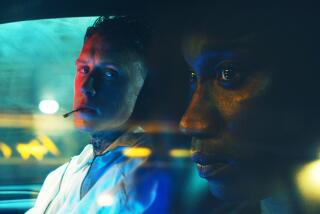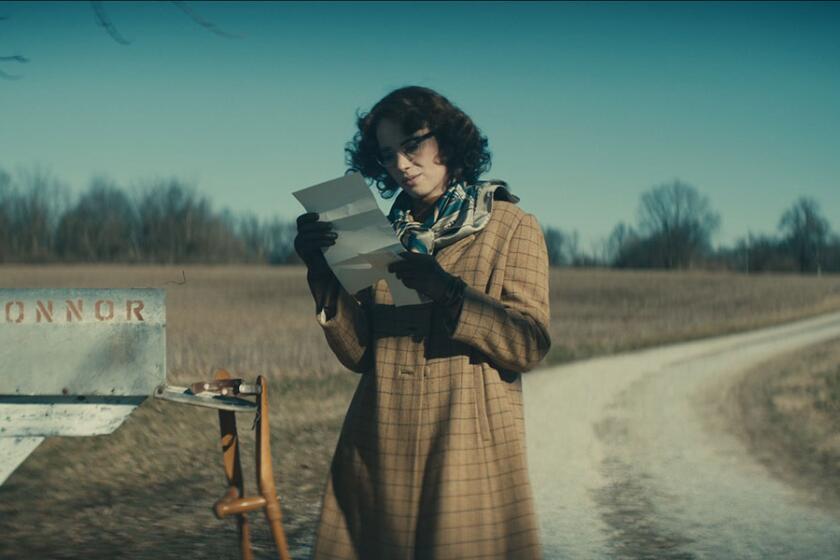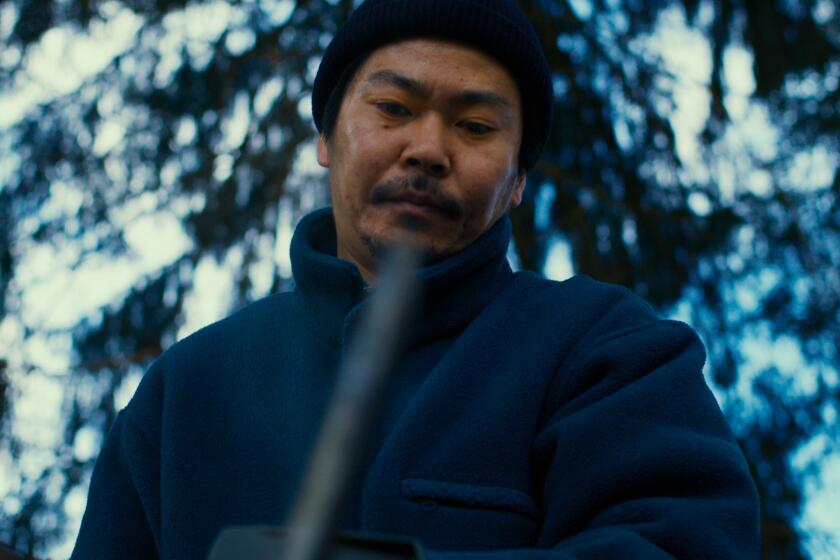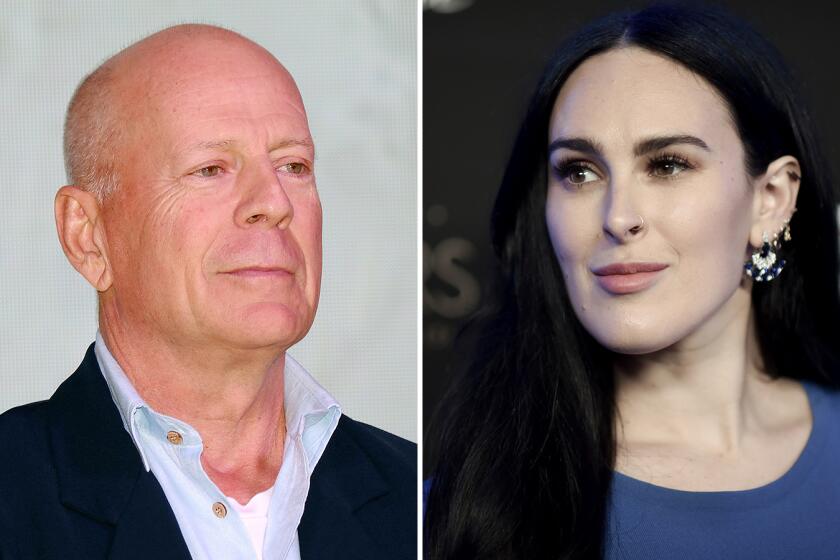Ben Affleck gets the manipulated man’s every twist and turn right
Ben Affleck has played virtually every style of loser lug on-screen, each lug better than the last.
Even when his character appears to be in charge, like his CIA agent in “Argo,” you’re not surprised that the Americans he’s supposed to be saving in Iran during the 1980 hostage crisis are nervous.
Now in “Gone Girl,” Affleck and director David Fincher conspire to give us Nick Dunne, one of those classic movie characters we love — the manipulated male.
It’s a strange fascination we have with men like Nick. They fall short of that old film cliché — men want to be them, women want to sleep with them. Because men don’t want to be them, yet they can relate. And women don’t want to sleep with them, but often do end up in bed with them.
Somewhere in that disconnected discontent, Hollywood discovered a narrative gold mine. From first frame to final, there is perhaps no better defining example of the manipulated man in the movies than in Billy Wilder’s “Double Indemnity.” Barbara Stanwyck’s restless wife woos her insurance broker, a classic fall guy played by Fred MacMurray, into offing her husband. By the end, if you’re not wringing your hands, you’re taking notes.
Blinded by or distracted by love or lust, these are men ready to be plied and played. It is in adding that layer of sexual tension that the nature of the deception changes — from espionage for country, say, to emotional betrayal.
Though there is an occasional gender reversal — Glenn Close as a defense attorney duped by her murdering client in “Jagged Edge” — men own these parts. Comedies use the conceit as well. One of Nicolas Cage’s finest moments remains his turn as Holly Hunter’s desperate-to-please husband in “Raising Arizona.” And I’d put Vince Vaughn’s ability to emote vacuousness in “Wedding Crashers” right up there with the best.
But it is in dramas, when the stakes are life-and-death, that the implications begin to feel electrifying, and we find the manipulated male in top form.
In “Gone Girl,” Affleck’s Nick is the cheating husband of his very angry spouse, played impeccably by Rosamund Pike. She’s disappeared and he’s left behind, accused of her murder.
Many ideas in “Gone Girl’s” relationship baggage are perfect for unpacking by an often-clinical filmmaker like Fincher and a frequently caustic author like Gillian Flynn, who adapted her novel for the big screen. But the pull of the manipulated male is strongest.
The end game in the film affairs that capture these men is usually money or revenge or both. If revenge is the driving force, as it is in “Gone Girl’s” murder plot hatched after Pike’s Amy discovered Nick’s affair, it means most of the film will be spent in punishing the crime.
More often, the chance of reaping a great deal of money is triggering the Machiavellian moves. The man is merely the pawn, like the small-town guy Peter Berg played in “The Last Seduction.” Linda Fiorentino did the dirty work of seducing him to take care of a few messy problems, only to discard him.
The character, even though it requires playing the fool, clearly appeals to actors. An impressive list of A-listers have stepped into these shoes.
William Hurt in “Body Heat” has no chance against Kathleen Turner’s hot and bothered siren. She lures the small-town lawyer into an exceedingly fine web of double-dealing and deception that leaves her a rich widow in the sun and him holding the bag.
Faye Dunaway played the fragile and fraught female while carefully wrapping Jack Nicholson’s private eye around her finger in “Chinatown.” Roman Polanski’s direction of Robert Towne’s script raised mind games and manipulation to an enigmatic new level.
Michael Douglas used to be one of the go-to guys for entrapment in films like “Basic Instinct,” with Sharon Stone making the moves, and “Fatal Attraction,” with a surprise twist changing the expected fate of the backstabber played by Glenn Close. The genre is a rich one, and the examples are countless.
I’m not, by the way, suggesting these characters are idiots — that wouldn’t play nearly as well as a smart enough man being fooled. It’s rather that they misread all the subtext slipped between the lines.
Affleck is particularly good at this sort of un-amplified stoicism. It surfaces in some way in nearly all of his work. To good effect as Superman actor George Reeves in “Hollywoodland” and a compromised congressman in “State of Play.” He was equally nonplused to learn his girlfriend was a lesbian in the lunacy of “Gigli.”
There are many reasons for the Affleck affect. His build, which at least pre-Batman buffing up, was big but a bit soft around the edges, suggests a kind of weakness than can be toyed with, tempted. His good looks are of the type that result in the dumb blond effect that dogs pretty women. His chiseled cheeks, that dimpled, slightly jutting chin, that all-too-easy smile — he could be a model for a movie-star Ken doll.
It is Affleck’s eyes, though, that make for exceptional manipulation material on-screen. He is the master of the blank stare, and the actor uses it to great effect in “Gone Girl.” A shot of Nick at a press conference next to a huge photo of his missing wife — the smile forced, the eyes dead — condemns him just as Amy knew it would.
Director Fincher fully exploits Affleck’s ability to shut down emotions and stare straight into the camera — without fear, or hesitation, or anger, or regret, or thought. Instead you’re met with an incredible sense of nothingness. It’s confusing when you can’t read the eyes, which in “Gone Girl” means everything.
That talent of not telegraphing intention, emotion or intellect has served the actor well over the years. It is also, I would suggest, the reason for some of the outpouring of anger that came with the announcement that he would be our next Batman.
The Batman mythology of an intelligent and indomitable Caped Crusader has long entertained legions of fans. Yet nothing about the ethos of the iconic character seems in sync with the quintessential Affleck sensibility.
And look at the league of gentlemen he joins — the incomparable Michael Keaton, the remarkable Christian Bale — both actors of great emotional nuance, who earned high marks for their portrayals of the Dark Knight. Adam West, the actor who brought Batman to life on TV in the 1960s and has continued to reprise him in the years since, has a look very like Affleck’s, including that strong chin. But at the height of his Batman days, his eyes had a way of looking bruised and angry.
With three Batman films in the works — “Batman vs. Superman” and “The Justice League” parts one and two — Affleck has a lot riding on his ability to morph into something more. To make the superhero truly soar, he’ll need to fling open those windows to the soul.
Whether the Bat gig sticks or not, redemption will forever be waiting in the wings with yet another lug who fits ever so nicely into some woman’s plan. We’ll be waiting, Ben. We love that guy.
Twitter: @BetsySharkey
More to Read
Only good movies
Get the Indie Focus newsletter, Mark Olsen's weekly guide to the world of cinema.
You may occasionally receive promotional content from the Los Angeles Times.







